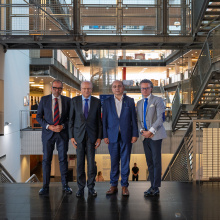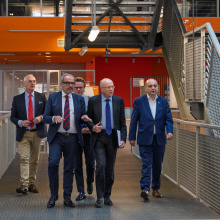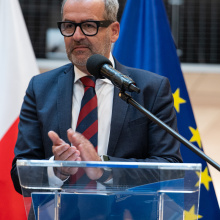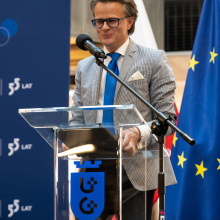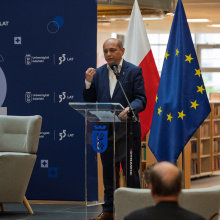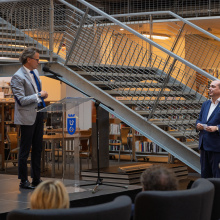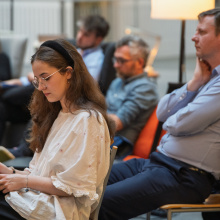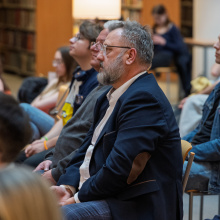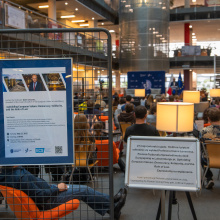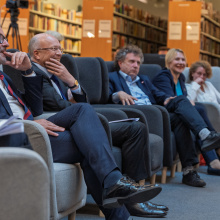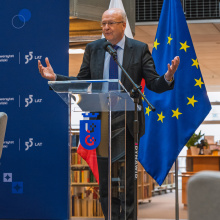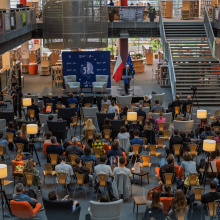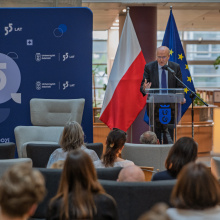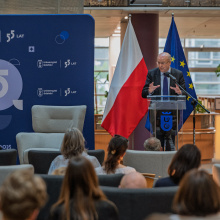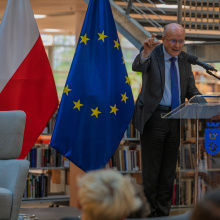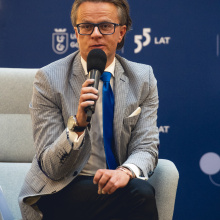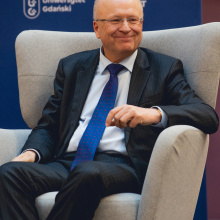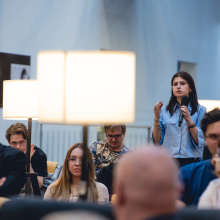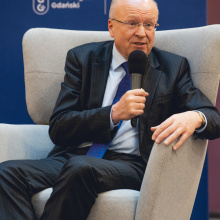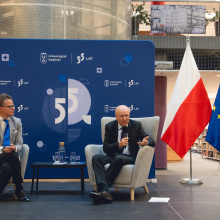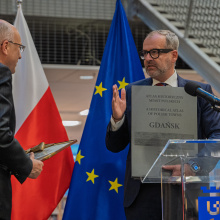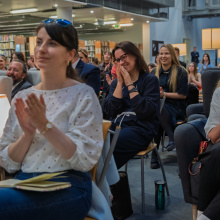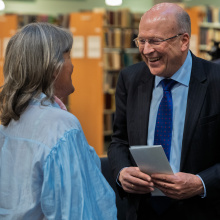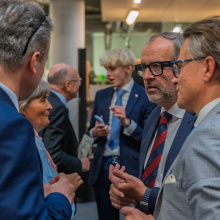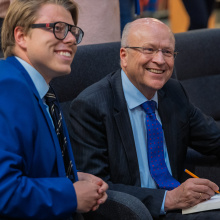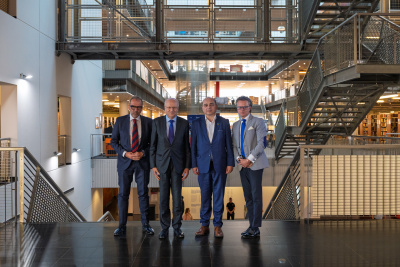
‘The Treaty on the European Union states that the Union is founded on the following values, which are common to the Member States: respect for human dignity, freedom, democracy, equality, the rule of law, and respect for human rights, including the rights of persons belonging to minorities. The Court has stated in its case law that these values, and I quote, ‘define the very identity of the European Union's as a common legal order’ - said prof. Koen Lenaerts, President of the Court of Justice of the European Union, who gave an open lecture at the Main Library of the University of Gdańsk on May 27, 2025.
Prof. K. Lenaerts visited Gdańsk at the invitation of the Rector of the University of Gdańsk, Prof. Piotr Stepnowski, the head of the Department of European Law and Comparative Law at the University of Gdańsk, Prof.. Tomasz Tadeusz Koncewicz, and the director of the European Solidarity Centre, Basil Kerski.
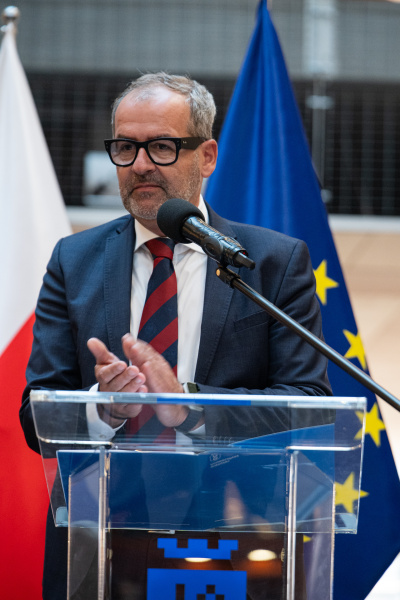
The event was attended by representatives of local and state authorities, the diplomatic corps, and of the Gdańsk judiciary. Also present were the academics, undergraduate and doctoral students from our university, as well as members of the University of Gdańsk Council.
The meeting was part of the celebrations of the 55th anniversary of the University of Gdańsk and also highlighted the fact of the Polish Presidency of the European Union.
‘Ladies and gentlemen, in my first words, I would like to thank Professor Koen Lenaerts for accepting our invitation - that is, the invitation of the University of Gdańsk and the European Solidarity Centre - to deliver this extraordinary lecture,’ said UG Rector Professor Piotr Stepnowski. ‘Here, at this university, it has a particularly symbolic dimension. This year, we are celebrating the 55th anniversary of our establishment. And this very year, in this very jubilee, we are hosting an authority who upholds the legal order of the European Union. We welcome him here, in the city of freedom, in the city of solidarity, true solidarity that gave rise to the fall of communism in Poland. Solidarity, which means community - one in which human rights are respected, including the right to freedom of expression, where the dignity of the citizen is respected, and when solutions to problems are sought in a culture of peace.
Solidarity as a fundamental value in the European context was also alluded to in the welcome speech by the co-organiser of the meeting, the director of the European Solidarity Centre, Mr Basil Kerski:
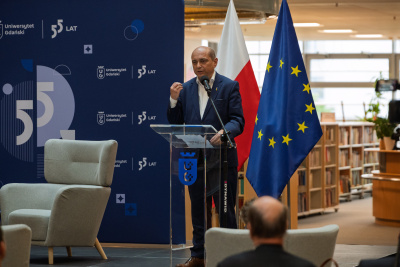
‘I am happy to be here and to welcome you, not for the first time in Gdańsk,’ he said to Professor Koen Lenaerts. ‘I am very pleased that you will now try to connect what is given for us, but what is currently also being deeply discussed in Europe, even in the heart of Europe: what is democracy? We often emphasise that democracy is free elections. No, that’s not right. Democracy is much more. It is based on the idea of solidarity, but a solidarity that is rooted in fundamental human rights. This means that every community in a democratic country such as Poland or Belgium is responsible not only for its country, its region, its city, but for much more.’
The spiritus movens of the lecture, Professor Tomasz Koncewicz, began his introduction to the lecture and presentation of the guest with a personal recollection of May 1, 2004, the date of Poland's Accession to the European Union. On that day in front of the Court of Justice building on the plateau of Kirchberg in Luxembourg he stood shoulder to shoulder with Professor Koen Lenaerts and many others, including former judges of the Court, watching the flags of the 10 new Member States go up. It was a moment that for his grandparents' and parents' generation, as well as his own, provided the element of both closure and the new beginning. The closure, because we had finally managed to rejoin Europe. And the new beginning, given all the opportunities and challenges facing a Member State of the European Union, which Poland became on May 1, 2004.
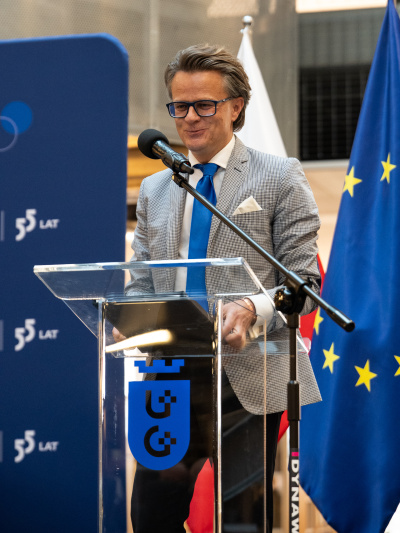
Professor T. Koncewicz also referred to the inextricably linked values that lie at the core of and underpin the European Union: democracy, solidarity, the rule of law as well as the message of ‘never again’, which resonates particularly strongly in Gdańsk:
‘When we ask about solidarity, democracy, and the rule of law, we are asking the wrong question about ‘what’. What is the rule of law, what is democracy? However, I am not interested in the question of ‘what’. I would like to go back to 1951 and ask the most fundamental question: why? Why democracy? Why solidarity? Why the rule of law? Our mutual friend, former British judge at the Court of Justice David Edward, once told me that we Europeans have become too obsessed with the question “how”, completely losing sight of the key question of “why”. Why are we Europeans together despite all our differences? And when I think about the question “why”, I think about the fundamental principles of the post-war order in Europe. There are four elements that are key to our understanding of why we Europeans live together today as neighbours and no longer as strangers: the importance of learning from the mistakes of the past; faith in the law as a force for rebuilding democracy after times of destruction; the memory of “never again”; and supranationality based on a community of values and interests.’
Referring to history and the political situation, Prof. T. Koncewicz emphasised that the most important lesson from the past must be ‘never again’ - and that we should not treat this ‘never again’ as something that is given and set in stone. We must constantly return to the basic questions, values, and fundamental principles behind the question ‘Why?’ and reconsider them over and over again.
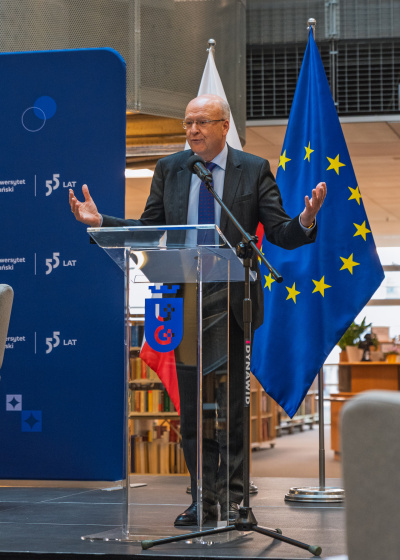
Professor Koen Lenaerts at the beginning of his lecture (the full text of the lecture is available in the attachment and in the form of a video broadcast) emphasised how much he enjoyed returning to Gdańsk, the cradle of solidarity, a place of great importance for Polish democracy, which symbolises all the values that make the European Union what it is today - a political community. The President of the CJEU pointed out that the EU is not a supranational, foreign or distant entity - it is simply a new level of joint governance. The European Union is not a state, nor does it aspire to be one. We have enough states in Europe. The Union's vocation is to skilfully integrate into the reality of our continent, which has so far been dominated by states. President Lenaerts emphasised that the Member States, while remaining sovereign states, have democratically decided to exercise certain aspects of their sovereignty within the community in a spirit of solidarity and respect for equality. Why? Because this is the only way to be effective and respond to cross-border challenges, such as caring for the environment:
‘Dirty air or dirty water do not stop at national borders,’ said Prof. K. Lenaerts. ‘There are many policy areas where Member States can only govern effectively and efficiently within a community. The European Union is not a state. The Court of Justice of the European Union states this clearly in its case law. It is a common level of governance at which the Member States - currently 27 - agree with each other. However, while remaining in accordance with its own constitutional requirements for the joint management of certain areas, each Member State needs to have certain sufficient common features with other Member States at its core. To put it bluntly, no democratic country wants to be part of a community with countries that are dictatorships and autocracies that do not respect human rights and do not show a minimum sense of solidarity. It is therefore very important to recognise that the European Union is part of each of the 27 countries. The European Union is Poland. It is Hungary, it is Belgium, it is France. It is present as one of the dimensions of our national identity.’
Prof. K. Lenaerts emphasised that all Member States want to be seen as members of a club that shares the same understanding of what makes life worth living, what makes society valuable and how it should be organised. These are the fundamental values that can be thought of in very idealistic terms, but which are, in essence, concrete and close to everyday experience. The values on which the Union is based are not imposed on the member states, but are built and reconstructed in accordance with the ‘bottom-up’ approach, since these values are informed by and derived from, among other sources, the constitutional traditions of the Member States. Professor argued that it is precisely these common values accepted by all that make the Union a ‘common legal order’ and that determine its identity. It is the values we share with others that make this legal order unique. As such, they serve as a moral compass for the community.
Professor Lenaerts outlined the fundamental values enshrined in the Treaty on the European Union: democracy, solidarity and the rule of law, showing how they shape the lives of EU citizens and influence the functioning of the community. He emphasised their inextricable link and the fact that they cannot be interpreted in isolation from one another. They are existential in nature: we are together in a community because we share certain fundamental values and are prepared to respect them.
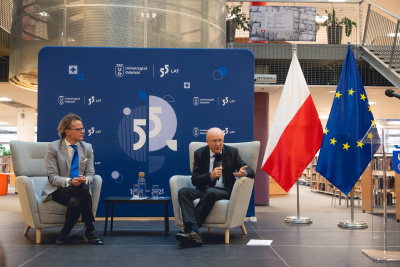
The rule of law is the foundation of the community. There can be no community without the rule of law, and there can be no rule of law without independent judges. Professor Lenaerts particularly emphasised the role of independent national courts as guarantors of the equal and non-discriminatory application of European law to all citizens of the European Union who enjoy the freedoms and rights guaranteed by the Treaties. It is the independent judges who ensure that when a citizen of a Member State exercises these freedoms and choses as the centre of his/her life the state other than his/her state of origin, he/she will not be treated worse in the state of their adopted residence than the citizens of that state. It is precisely the national courts that are independent of political power that are supposed to curb the natural tendency of Member States to favour their own citizens at the expense of citizens of other states and to ensure that when States interfere with the rights of EU citizens, they comply with one of the fundamental principles of the law of integration, namely the principle of proportionality. This integration of EU citizens into the life of the state that they have chosen for themselves and their families constitutes the great added value of the peaceful post-war integration of Europe. Professor Lenaerts mentioned in this context the example of a befriended Polish family who live in his hometown near Leuven in Belgium, and who has become an important part in the life of the local community.
The dimension of solidarity, in turn, is the glue that binds countries together within a community of interests and values. The principle of solidarity permeates all aspects of Member States' actions in their mutual relations. When you are a member of a community, you are also guided by the interests of other states within that community and of EU citizens who enjoy the rights and freedoms guaranteed by the Treaty. To illustrate the operation and consequences of the principle of solidarity, Prof. K. Lenaerts referred to the judgment of the Court of Justice of the European Union in the case Poland v. Germany, which concerned energy solidarity in the context of ensuring energy security for each Member State (in this case, guaranteeing the security of gas supplies to Poland). Referring to this judgment, Prof. K. Lenaerts emphasised that the principle of solidarity is a fundamental principle of EU law and encompasses rights and obligations for both the EU and its Member States, as the EU has a duty of solidarity towards its Member States, and those states have the same obligation in their relations with each other and towards the common interest of the Union.
In the final part of his lecture, Prof. Lenaerts emphasised the importance of democracy as a core value of the European Union and its foundation, highlighting the material dimension of democracy:
‘Being a citizen of the European Union gives you - gives us - the right to be treated with dignity, with respect for freedom, equality and solidarity. This can only be achieved in a system based on the rule of law, with independent and impartial courts operating in accordance with the principles of fair trial, and democracy based on pluralism and tolerance. This means that, yes, in a democratic system we have political opponents, and not enemies, with whom we compete and with whom we engage in the discourse based on reasons and arguments. A nation cannot be reduced to a statistical majority. A nation is all of us, working together and forming a community. The great idea and value of democracy is to protect all members of the community, those who belong to minorities as well as those who belong to the majority.’
Consequently, in his speech, President K. Lenaerts highlighted the often-forgotten liberal aspect of the democracy. Democracy as a fundamental value of the Union can never be reduced to the mere expression of the will of the majority and majority rule. Liberal democracy means respect for the fundamental principles of the legal order and the Constitution, as well as the obligations arising from membership of the European Union. Liberal democracy is the rule of values.
Professor Lenaerts recalled that ‘United in diversity’ is the motto of the European Union and explains its essence. At the same time, however, there must be an element of common values that we share with others and that make us a community, ensuring that together we aspire to ‘the closest possible union between the peoples of Europe’. On this shared journey, what unites us and makes us Europeans is more important than what may divide us. Everything is bound together by the overarching goal of ‘ever-closer Union among peoples of Europe’.
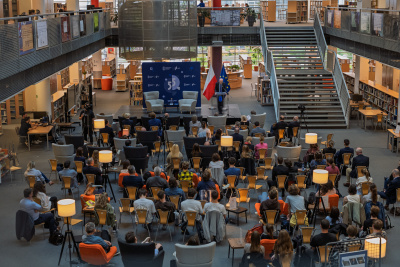
The few minutes that were left after Prof. Lenaerts' lecture provided a good opportunity for asking questions. The young participants asked questions about, among other things, the danger of increasing polarisation in society and politics and its impact on the level of political discourse, as well as the threats to the Union from those Member States that question the liberal foundations of the post-war European order rooted in democracy, the rule of law and respect for human rights.
After the discussion, the Rector of the University of Gdańsk, Prof. Piotr Stepnowski, thanked President Lenaerts for his lecture and for highlighting the importance of values for the European community in the process of building its identity and protecting the rights and freedoms of EU citizens.
At the end, the Rector presented Mr Lenaerts with the framed representation of Gdańsk's Golden Gate as well as the unique collection of maps of Gdańsk published by the University of Gdańsk Press.
Prof. Koen Lenaerts' lecture was available via live stream on the university's YouTube channel. It attracted a lot of interest and was followed by listeners from all over Europe.
Thanks to the kindness and generosity of Professor Koen Lenaerts, the text of the lecture delivered at the University of Gdańsk on May 27, 2025, is available below. We invite you to read it!
Information about the lecture itself and a complete set of accompanying documents can also be found at: https://bg.ug.edu.pl/news/115135/prezes-trybunalu-sprawiedliwosci-ue-z-wykladem-otwartym-w-bug (Polish version) and https://ug.edu.pl/news/en/8555/president-court-justice-european-union-give-open-lecture-ug-library (English version).

